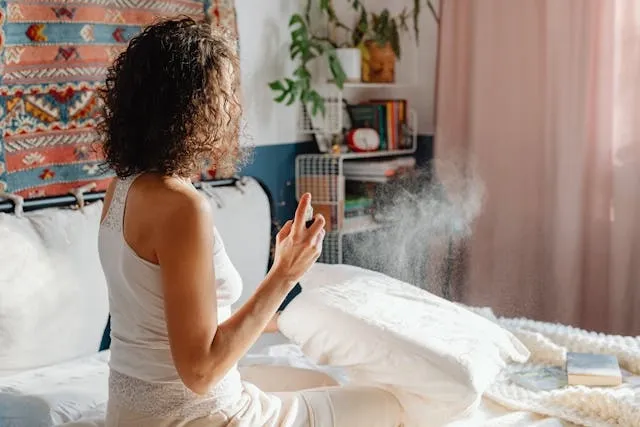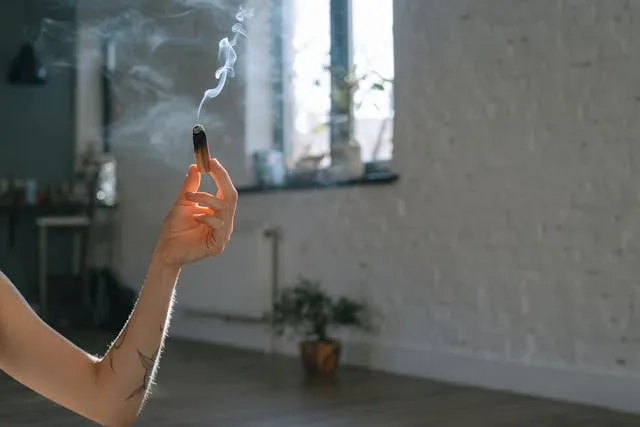Are Plug In Air Fresheners Safe? Risks, Pet Safety, Toxic Ingredients, And Fire Hazards
Plug-in air fresheners are popular devices that use heat or electricity to disperse scented oils into indoor air. They plug into wall outlets for continuous fragrance release, but there are many who wonder: are plug-in air fresheners safe?
In this guide, we aim to clarify myths and evidence to help you use plug-ins safely or choose safer alternatives.

Key Takeaways
- The main worries about plug-in air freshener safety include toxicity from VOCs, phthalates, and synthetic fragrance compounds.
- Overuse may cause headaches or allergic reactions, and pets like cats, dogs, and birds can be more sensitive.
- Manufacturer guidance matters, and you should pay attention to fire risks or consider using safer alternatives like essential-oil diffusers.
- We supply high-quality custom air fresheners primarily aimed at cars, but they are safe and free from any toxins.
Table of contents
-
Are Plug In Air Fresheners Safe?
-
Are Scented Plug-Ins Safe For Use Around The House?
-
Are 'Natural' Plug-In Air Fresheners Really Safe?
-
Can Plug-In Air Fresheners Make You Sick?
-
Are Plug-In Air Fresheners Safe Around Pets?
-
Do Plug-In Air Fresheners Pose A Fire Hazard?
-
How Long Should You Leave A Plug-In Air Freshener On?
-
Are There Safer Alternatives To Plug-In Air Fresheners?
-
Are Plug-In Air Fresheners With Night Lights Safe?
Are Plug In Air Fresheners Safe?
Plug-in air fresheners are fragrance devices that disperse scent automatically when plugged into an electrical outlet. Most rely on heat or fans to diffuse a liquid fragrance into the air over time. They are popular for their convenience, but they raise valid safety questions.
Concerns range from potential fire hazards to indoor air pollution. Many have heard reports of overheating units or fragrance oils causing allergic reactions, prompting consumers to reconsider their use. Many plug-ins contain volatile organic compounds (VOCs) that degrade air quality over time.
The ongoing debate around whether plug-in air fresheners are safe covers both physical risks and chemical exposure. If you have concerns about this, consider our custom metallic air fresheners for a stylish and low-emission alternative.

Can You Leave Plug-In Air Fresheners On All The Time?
Many users wonder: can you leave plug-in air fresheners on all the time without safety concerns? Most manufacturers design their products to be left plugged in continuously. However, this leads to a risk of overheating, particularly in older homes or if the device malfunctions.
There are certain things that can increase risk, such as:
- Socket wear
- Prolonged heat exposure
- Poor ventilation
While modern models are often UL-certified, it’s wise to inspect outlets regularly. Reduce risk by unplugging during long absences or overnight. Are plug-in air fresheners safe 24/7? Only if they are used in accordance with manufacturer guidelines and monitored periodically for signs of overheating.
Are Scented Plug-Ins Safe For Use Around The House?
Scented plug-in air fresheners are popular but are they truly safe for home use? Products like Febreze plug-in air fresheners and Glade plug-ins undergo safety testing before they reach shelves. Many carry UL certifications that ensure compliance with electrical safety standards.
Nevertheless, the scents themselves may still raise health concerns, particularly in sensitive individuals. This is different to the physical concerns about some car air fresheners - in some locations, it is illegal to have air fresheners on your rearview mirror.
Even the best plug-in fresheners contain chemical compounds that can irritate those with allergies or respiratory issues. Plug-in air fresheners may be bad for you in the long run if they are overused or applied in poorly ventilated spaces.
Enhance indoor air quality by:
- Rotating usage
- Opting for fragrance-free intervals
- Considering safer alternatives
Are Plug-In Air Fresheners Toxic To Humans And Pets?
Plug-in air fresheners often release volatile organic compounds (VOCs) and phthalates, which can accumulate in indoor air. Are plug-in air fresheners toxic to humans and pets? The answer is that they could be.
These substances can trigger symptoms ranging from respiratory irritation to endocrine disruption. Certain ingredients are even flagged as possible carcinogens, such as:
- Benzene
- Formaldehyde
Even products that sound pet-safe, like Air Wick plug-ins, can be harmful to birds, cats, and small dogs with sensitive airways due to the toxic oils. Thus, many users ask: why are plug-in air fresheners bad for you and your pets?
We recommend switching to custom-made, non-toxic air fresheners from our online store. Our custom woven air fresheners are designed for cars, but they can work in small indoor spaces as well and are non-toxic.
Do Plug-Ins Cause Cancer Or Other Serious Health Risks?
Concerns continue to grow around the possible risks of plug-in air fresheners and their link to serious illnesses. Research has shown links between plug-in air fresheners ingredients and various adverse health effects, and some formulations even contain substances linked to cancer in long-term exposure, such as:
- Benzene
- Toluene
- Formaldehyde
Though current research isn’t always conclusive, there are red flags, particularly for continuous use in unventilated areas. Plug-in air fresheners may not be bad for you if used occasionally, but children, pregnant women, and pets are particularly vulnerable.
For peace of mind, choose safer alternatives or clean frequently with an ultra-fine fiber cleaning cloth or avoid using air fresheners altogether.
Create custom hanging air fresheners
Our custom shape air fresheners are perfect for cars but can also work for other environments with many scents available.
Are 'Natural' Plug-In Air Fresheners Really Safe?
Not all plug-in air fresheners labeled “natural’ or “eco friendly” are as safe as they claim. While including these labels, they may still contain synthetic fragrances and lack transparency about ingredient lists.
Are plug-in air fresheners safe if they’re advertised as natural? Unfortunately, not always. Some manufacturers exploit regulatory loopholes to greenwash their marketing, giving a false sense of safety. In reality, even essential oils can trigger allergies or harm in pets.
So why are plug-in air fresheners bad for you even when labeled green? The answer is misleading claims and vague ingredients. Always use in well-ventilated areas and keep air flowing with things like custom rechargeable carabiner hand fans to maximize your own safety.

Can Plug-In Air Fresheners Make You Sick?
The answer to whether plug-in air fresheners can make you sick is yes, particularly for people with allergies, asthma, or chemical sensitivities. It is certain ingredients that cause the potential dangers of air fresheners, including things like:
- Synthetic fragrances
- Phthalats
- VOCs
These compounds are known to lead to headaches, dizziness, fatigue, or respiratory distress for some people, particularly in enclosed spaces. How long air fresheners last is a factor too, as long-term use can contribute to indoor air pollution, worsening the issues.
Are plug-in air fresheners bad only if you overuse them? Not necessarily. Even brief exposure can trigger symptoms in sensitive individuals. If you are concerned, explore healthier alternatives like air fresheners with clean formulations.
Can Plug-In Air Fresheners Cause Headaches?
Plug-in air fresheners can indeed cause headaches, especially in people who are sensitive to fragrance chemicals. These products emit a continuous stream of synthetic scent molecules, some of which could be classified as irritants.
Are air fresheners bad for you if they cause headaches? Absolutely, as recurring symptoms could point to underlying neurological or allergic triggers. Strong synthetic aromas often disrupt the brain’s olfactory processing and may even have an impact on serotonin levels. These are definitely things that you want to avoid.
So, why are plug-ins bad for you? Because even pleasant smells can overwhelm the nervous system. If you want to avoid this, switch to low-intensity air fresheners with natural scent options designed to soothe rather than overstimulate.
Looking for a stylish car air freshener?
Create a custom wooden car air freshener for a vent clip solution that is elegant and smells fantastic.
Learn moreAre Plug-In Air Fresheners Safe Around Pets?
Many commercial plug-in air fresheners contain ingredients that can be harmful to pets. Cats, dogs, birds, and rodents are particularly vulnerable. Substances like phenols and phthalates are risks, but even certain essential oils can be toxic to animals when inhaled or ingested. These include:
- Tea tree
- Eucalyptus
- Citrus
Cats, in particular, lack certain liver enzymes that are necessary to process these compounds, so they are more vulnerable to poisoning. Some breeds might exhibit increased sensitivity due to genetic predispositions or respiratory conditions. Birds are at exceptionally high risk as they have delicate respiratory systems that can be affected by mild airborne irritants.
If you’re a pet owner, read the ingredient labels and educate yourself on air fresheners and pets. The best solution may be to switch to a verified non-toxic product.
What To Do If Your Pet Eats An Air Freshener?
If your pet ingests part of a plug-in air freshener or its contents, you need to act quickly. The first step should be to remove any remaining product to prevent further exposure. Don’t try to induce vomiting unless specifically instructed to by a veterinarian. Call your vet or an emergency poison control hotline immediately.
Common symptoms of air freshener poisoning in pets include:
- Vomiting
- Drooling
- Diarrhea
- Lethargy
- Breathing difficulty
- Tremors
- Seizures
Some animals may exhibit disorientation or paw at their face due to irritation.
Prompt treatment is vital to reduce the risk of organ damage or death. If the exposure came from inhalation rather than ingestion, move your pet to fresh air and monitor for signs of respiratory distress.
Do Plug-In Air Fresheners Pose A Fire Hazard?
Plug-in air fresheners may pose a fire hazard if used improperly or manufactured with substandard components. Let’s look at the main concerns:
- Electrical malfunctions: Issues like short-circuiting or overheating are a primary concern.
- Long-term heat: Some units may become too hot over time or are placed near flammable materials like curtains or bedding.
- Degradation: The interior heating element that diffuses the scent might degrade the plastic casings, leading to warping or melting.
It is crucial to follow the manufacturer’s safety guidelines. Never plug units into power strips, avoid prolonged continuous use, and ensure the outlet is not overloaded. Older models or counterfeit products may lack built-in safety mechanisms.
If you are seeking peace of mind, consider alternatives with no electrical components. For businesses, giving out hazardous items is a major mistake when using promotional products.
Go for a personalized touch for your air fresheners
Whether for souvenir or branding purposes, create custom photo air fresheners that smell amazing.
How Long Should You Leave A Plug-In Air Freshener On?
The ideal duration for keeping a plug-in air freshener active depends on your environment. Generally speaking, it’s best to limit continuous use to 8-10 hours per day, particularly in enclosed or unventilated spaces.
Overuse can lead to things like:
- Scent fatigue
- Increased exposure to chemicals
- Potential overheating
Most plug-in devices are designed for use during waking hours and should be unplugged overnight unless they feature advanced temperature regulation. Refill cartridges usually last 30-45 days, though intensity settings and room size will have an impact on lifespan. Some users choose to alternate devices between rooms or unplug periodically to reduce power consumption and maintain scent freshness.
For a more energy-efficient, consistent alternative, consider non-electrical air fresheners.
Are There Safer Alternatives To Plug-In Air Fresheners?
Yes, you have several alternatives that offer fragrance without the health and safety concerns of plug-in air fresheners. Let’s look at what’s available to you:
- Essential oil diffusers: These disperse natural oils in water mist, but you should be cautious if you have pets.
- Baking soda jars: These, along with activated charcoal and beeswax candles, can absorb or neutralize odors without synthetic chemicals.
- DIY methods: Stovetop simmer pots using herbs and citrus are great for freshening air naturally.
If you prefer a ready-made solution, choose products certified by organizations like Green Seal or Made Safe. You could even turn to our custom air fresheners and learn how to hang air fresheners in cars and rooms in the home for vibrant, long-lasting scents.
|
Fragrance Option |
Description |
VOC Emissions |
Health Impact |
Aesthetic Appeal |
|
Reed Diffusers |
Natural sticks that absorb and release essential oils into the air |
Low to None |
Generally safe when using natural oils |
Subtle and decorative |
|
Essential Oil Mist Diffusers |
Use water and ultrasonic waves to disperse essential oils into the air |
Very Low |
Safe with quality oils; calming effect |
Sleek, modern designs |
|
Baking Soda Odor Absorbers |
Absorb odors without adding fragrance |
None |
Extremely safe; non-toxic |
Simple and discreet |
|
Custom Air Fresheners |
Plant-based, low-emission alternatives available in various signature scents |
Very Low |
Safe for daily use; non-irritating |
Stylish and customizable |
|
Plug-In Air Fresheners |
Constantly release synthetic fragrance oils via heat or fan mechanisms |
High |
May cause irritation or long-term health risks |
Widely available, but generic |

Want a leather design for your air freshener?
Choose style and personalization with our custom leather air fresheners and enjoy a pleasing aroma
Get startedAre Plug-In Air Fresheners With Night Lights Safe?
Plug-in air fresheners with integrated night lights are designed for dual functionality, providing both scent and ambient lighting. While convenient, this added circuitry could potentially increase the risk of electrical malfunction if poorly designed.
Potential issues when combining light and heat in a compact unit include:
- Overheating
- Clickering lights
- Short-circuiting
Some consumer reports have noted melting or discoloration of the casing over time, especially with brands that use cheaper materials. However, it is worth noting that these instances are not common, and devices from major manufacturers like Glade and Febreze are tested for safety.
If you want a more reliable and minimalist option, our custom eco kraft paper air fresheners for cars offer consistent fragrance without complex electrical components.
Frequently Asked Questions About Are Plug In Air Fresheners Safe
Are Plug In Air Fresheners Safe?
Plug-in air fresheners pose safety concerns including chemical exposure, fire risk, and health impacts, particularly in poorly ventilated spaces or when used continuously.
Are Plug-In Air Fresheners Toxic To Pets?
Yes, many plug-ins contain ingredients that are hazardous to pets. Cats, dogs, birds, and rodents are particularly at risk. Common toxins include phenols and some essential oils.